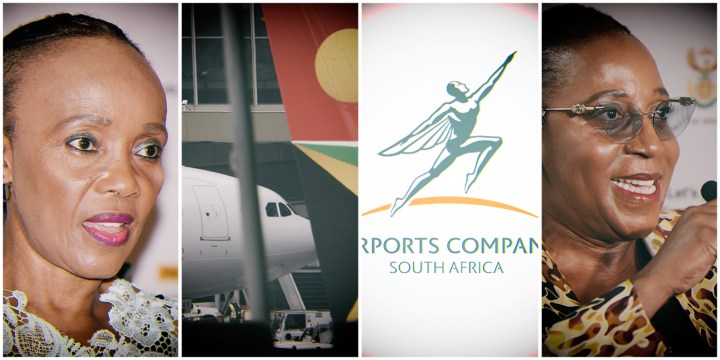SOE SOS
State green light on lower airport tariff hikes could jeopardise Acsa’s return to profitability

The government has approved lower-than-expected increases in tariffs and levies that the Airports Company South Africa charges those who use its airports and services. This could undermine its recovery from the pandemic.
The financial sustainability of the Airports Company South Africa (Acsa) might be in the balance as the state-owned operator of airports has been awarded tariff increases by the government that are considerably lower than what it requested.
Acsa manages South Africa’s nine biggest airports, including OR Tambo International in Gauteng, Cape Town International in the Western Cape and King Shaka International in KwaZulu-Natal.
It generates money by, among other means, charging a range of tariffs and levies to airport users, including landing and parking fees, as well as charges for passenger services.
Transport Minister Sindisiwe Chikunga has now approved tariff increases spanning Acsa’s financial years from 2023/24 to 2027/28. During this time, the tariffs will increase on average by 6.4%.
Acsa had asked for 17.5%.
According to Chikunga, the tariff increase will be implemented from 1 April 2024 in the following way: 4.5% increase during 2023/24 (the company’s financial year ends in March 2024); 10.3% in 2024/25; 6.51% in 2025/26; 6.16% in 2026/27; and 4.45% in 2027/28.
These tariffs are set by the regulating committee in Chikunga’s department. The committee then recommends the new tariffs to the transport minister, who makes the final decision.
The tariffs were announced by Chikunga during a media briefing on Tuesday about the state of the aviation industry, which is still recovering from the Covid lockdowns.
“These final tariffs … have been determined in the aftermath of Covid-19 when the aviation sector in the country is gearing itself to restore economic activity and also return to pre-pandemic performance levels,” said Chikunga.
The tariffs charged by Acsa have always been a contentious issue between the state-owned operator and the broader aviation industry.
In June 2023, the International Air Transport Association (Iata), an industry body, accused Acsa of wanting to push through tariff increases of 38%, which would have made it more costly for passengers to fly.
Ordinarily, airline companies would absorb unaffordable tariff increases by passing on the increased cost to passengers. This would affect the financial viability of the airlines as passengers would fly less frequently. It would also inhibit the growth of air travel and damage the tourism industry and the economy as a whole.
However, Acsa was quick to dismiss Iata’s claims about the 38% tariff increase, breaking down the tariffs it had applied for (17.5% in the first year, 17.5% in the second year and 0% for the remainder of the five years).
Acsa has argued that the increases were coming off a low base as it had reduced tariffs by 35.5% during its 2017/18 financial year.
Acsa, which depends heavily on the tariffs, is still recovering from the pandemic and is not yet profitable.
The company recorded an after-tax loss of R142-million during its 2022/23 financial year – a significant improvement on the R1-billion loss posted the previous year.
Acsa hopes to return to profitability from this year. However, this could be jeopardised by the government’s lower-than-expected tariff increases.
Acsa CEO Mpumi Mpofu previously said passenger volumes have recovered and are close to pre-Covid levels.
In the state-owned enterprise universe, Acsa is considered more stable than Eskom and Transnet. It still publishes its financial results on time, which helps inform the public and investors of its financial situation.
Acsa has paid dividends and can stand on its own without taxpayer-funded bailouts. DM













 Become an Insider
Become an Insider
ACSA is just another overstaffed, overpaid SOE, ANC cash cow.. Its tarrifs and staff numbers should be halved not raised.
While airlines are in a far better position to confirm this, similar to our sea ports, ACSA’s airport charges are apparently among the most expensive in the world.
Zero sympathy for ACSA
“This could undermine its recovery from the pandemic.” you must be referring to the cANCer pandemic because the other one has gone past some time back
ACSA we are all recovering from COVID but a 17.5% increase is unacceptable by any means. look at your costs and reduce those rather than screwing the consumer! as far as I have seen the services ACSA offers has not improved at all with no attempt to improve even just the basic attitude of staff. I assume they will not be getting 17.5% increases!
I think the fee increases are more than reasonable. I think despite this they will show profits in the next 3 yrs as flight volumes have grown. Especially Cape Town and JHB